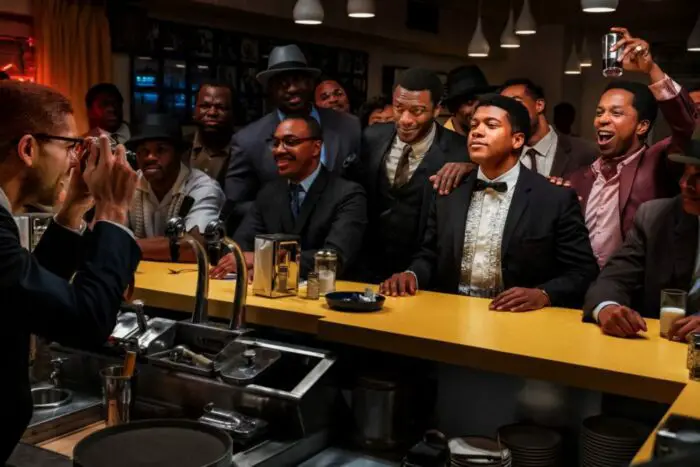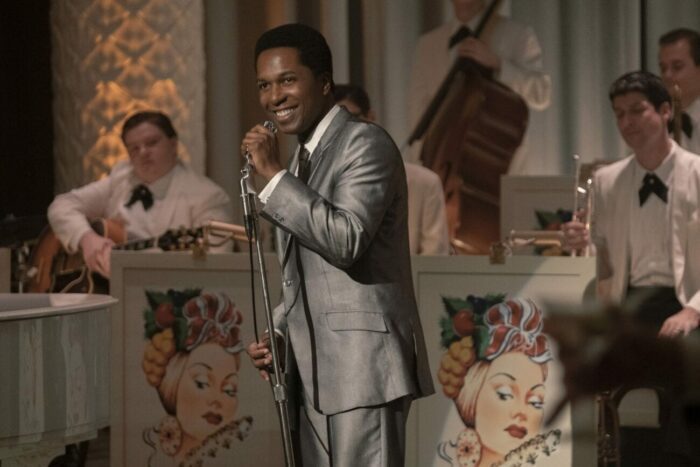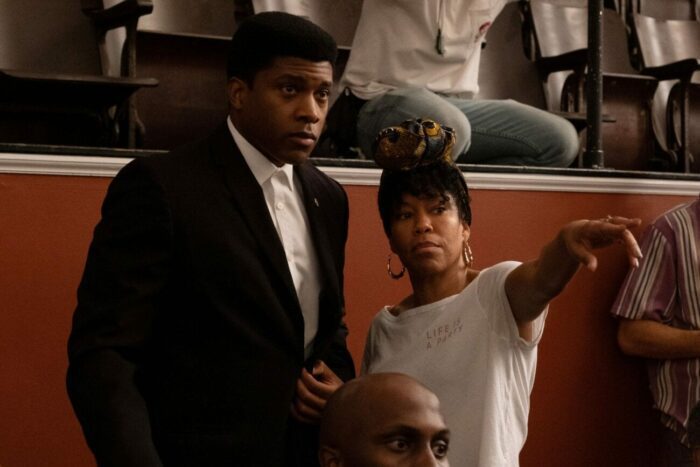Fans of celebrities, some of which border closer to hounds than admirers, love to speculate what their favorites are like when the cameras are off. In today’s day and age, the wonderment of how open or, dare I say it, “normal” celebrities are spans between glimpses spread across the personally curated Instagrams and the invasive observations of TMZ. Between their magazine page turns and social media swipes, fans fancy who the real friends of the famous are and what they must be like together. Take a few online articles like these from Marie Claire and Insider.com that describe a few well-known besties and their background relationships.
Far from tabloid fluff and hard on truths, One Night in Miami is an intersection of legends that would blow up Twitter had it existed 56 years ago. Set in the heat of Florida and the civil rights movement of 1964, the viewer is indeed a fly on the wall to the confluence of talents collected among boxer Cassius Clay, football great Jim Brown, recording artist Sam Cooke, and the influential leader Malcolm X. Based on Soul contributor Kemp Powers’ verbose one-act stage play, debuting feature director and If Beale Street Could Talk Oscar-winning actress Regina King envisions a crossroads that is not only a meeting of the minds, but a collision of souls. This film debuts Christmas Day with Amazon Prime expansion in January.
The night is February 24th and the 22-year-old Cassius Clay (Eli Goree of Riverdale) has just upset Sonny Liston at the Convention Hall to become the new heavyweight champion of the world. In attendance at that historic fight were three of his friends. Jim Brown (Aldis Hodge of Brian Banks) was ringside doing color commentary on a media outlet. Sam Cooke (Hamilton’s Leslie Odom Jr.) famously made it into the ring for the post-fight celebration and interviews. Highest of all, guiding the soon-to-be Muhammad Ali at his public side as a counseling confidante, was Malcolm X (Kingsley Ben-Adir of The OA). The four had plans to meet up at Malcolm’s hotel to celebrate.

Now, judging by storied perception of the “Louisville Lip” and his towering ego on the biggest night of his young career, one might expect One Night in Miami to set off a boastful barnburner of boozy partying and liberating frolic. The result is quite the contrary. There are no bars, no girls, no flashbulbs, and no hanger-on fans. It is just these four influential men and the hotel spaces before them as they wrestle with the gravity of the moment and share the ongoing bigotry they have experienced on different levels and from different sources. To celebrate here is the exhale and vent, not dance and prance.
Each man carries a different personality capable of both clash and cohesion with their dynamic. Malcolm is the straight arrow fearing foreboding menace outside of his ever-present security detail (led by Lance Reddick). Clay is the talker reforming to embrace Malcolm’s soul-quieting teaching as he transitions to Islam. Brown is weighing a career change from the gridiron to Hollywood, and Cooke is the showy one basking in his public appeal and shrewdly earned riches. All have their vices and all have their divergent core ideals.

These men understand each other and their fame. In unity, they mean to be there for each other. There is trust where confrontations and challenges are open in a safe arena. However, the colloquial temperature rises when Malcolm continues to call out the kowtowing Sam for not being as deep in the racial struggle as others claiming “you’ll never be loved entertaining the children of bigots.” Sam defends his economic freedom and counters to contest Malcolm’s clinging to stars like Cassius for exploitative benefit. Tempers digress further as the idols hardline to prove something about themselves and for themselves.
Clay asserts that, to him, “black power is a world where we get to be ourselves” and “do whatever we want.” Malcolm echoes that dream from another direction. At the crux of Malcolm’s pushing is how these men use their stature for larger influence than personal comforts. Prestige can bring greater and wider betterment. He considers each man one of the greatest possible weapons for the racial cause. They have each earned acclaim and riches and the leader pleads for greater effort and impact. Malcolm foresees that decision points are coming in their futures. How right he would be. Within a year from this undocumented night, two of the four would be dead.

One would think it would take the biggest pros to portray the highest clout. Rather than tab bigger names or familiar faces, Regina King guided lesser names with no less talent who could melt into the eminence. With high praise, each of the leading ensemble members acquit themselves marvelously, from tics and accents to powerfully embodying morals and flaws. Chief among them are Kingsley Ben-Adir and Leslie Odom, Jr. as the primary conversational combatants. Their scenes, mostly silent when not scored by jazz king Terence Blanchard and shot with intimacy by Beyond the Lights cinematographer Tami Reiker, scorch with honesty and moving significance.
Coming from stage origins, One Night in Miami is very much an actor’s showcase to monologue, argue, and sermonize. Feeling “stagey” is the objective, yet King expands the film in a formative fashion to include outstanding period recreations of boxing matches, performance stages, and television appearances of where these men were before this night and where they evolve after. The weight of the legacies surrounding these four historical characters created a tall order for any actor or filmmaker trying to fill those respective shadows. At no point does One Night in Miami falter with strength to honor its subjects. The beauty of the script and King’s direction is creating confines where these legends, and their actors, can behave and orbit as equals. There are no winners or losers, only collective gain for all.



